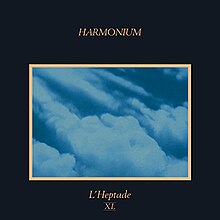
A musical ensemble, also known as a music group or musical group, is a group of people who perform instrumental and/or vocal music, with the ensemble typically known by a distinct name. Some music ensembles consist solely of instrumentalists, such as the jazz quartet or the orchestra. Other music ensembles consist solely of singers, such as choirs and doo-wop groups. In both popular music and classical music, there are ensembles in which both instrumentalists and singers perform, such as the rock band or the Baroque chamber group for basso continuo and one or more singers. In classical music, trios or quartets either blend the sounds of musical instrument families or group instruments from the same instrument family, such as string ensembles or wind ensembles. Some ensembles blend the sounds of a variety of instrument families, such as the orchestra, which uses a string section, brass instruments, woodwinds, and percussion instruments, or the concert band, which uses brass, woodwinds, and percussion.
Harmonium was a Quebec progressive rock band formed in 1972 in Montreal. It became one of the most well-known music bands in the province of Québec in the 1970s and continues to hold an iconic and influential status to this day.
"Pour un instant" is a song by the Quebec folk rock band Harmonium from their 1974 self-titled debut album. Written by band members Serge Fiori and Michel Normandeau, it was released on vinyl as a single in April of that year, along with the B-side "100,000 raisons".

It's a Love Cult is the tenth full-length studio album by the Norwegian band Motorpsycho. The album was preceded by the EP release of "Serpentine", for which also a video was made.
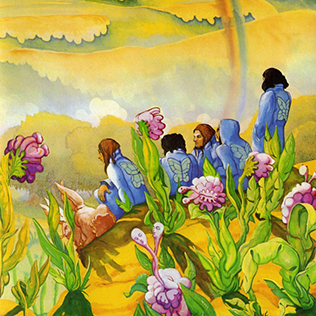
Si on avait besoin d'une cinquième saison, better known as Les cinq saisons, is the second studio album by Canadian progressive rock band Harmonium. It was released on April 15, 1975, in Canada by Celebration Records, a subsidiary of Quality Records. It was the band's second and final release for the label, as its contract ended in October 1975. Les cinq saisons was released in France via Gamma Records. PolyGram, which absorbed the interests of Quality Records, later reissued the album on various formats in several countries.
Tom Howard was an American pianist, musical arranger and orchestral conductor.

Harmonium is the eponymous debut album by Québécois folk rock band Harmonium. It was originally released on February 20, 1974, by Celebration Records, a subsidiary of Quality Records in Quebec. The release received numerous reissues over the years via such labels as Atlantic Records, Polydor Records, Gamma Records, and Quality Records proper, across the rest of Canada and in France.

Elton John and Tim Rice's Aida is a 1999 concept album that contains songs with music by Elton John and lyrics by Tim Rice from the 2000 musical Aida.
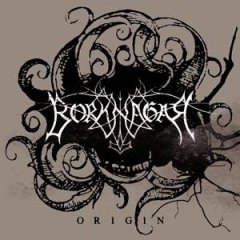
Origin is the seventh studio album by Norwegian heavy metal band Borknagar. Origin explores the band's more progressive and traditional elements and is primarily an acoustic effort.

Variations is a classical and rock fusion album. The music was composed by Andrew Lloyd Webber and performed by his younger brother, the cellist Julian Lloyd Webber.
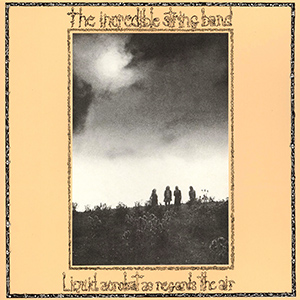
Liquid Acrobat as Regards the Air is the ninth album by the Incredible String Band. It features Mike Heron, Robin Williamson, Licorice McKechnie and Malcolm Le Maistre. The album was the band's first almost entirely electric recording; a new feature that was to define the change in the band's sound throughout their final period through 1974.

Jaune is an album by Jean-Pierre Ferland, released in 1970. Considered an enduring classic of Canadian and Quebec music, the album was named the 71st greatest Canadian album of all time in Bob Mersereau's 2007 book The Top 100 Canadian Albums. It was the only francophone album from Quebec named to the list besides the three studio albums by Harmonium.
Serge Fiori was the lead vocalist and guitarist for Harmonium, a progressive rock band from Quebec. After Harmonium broke up he pursued a solo career.

Monoliths & Dimensions is the sixth studio album by American drone metal band Sunn O))). The album was created and recorded over a period of two years and features the collaborations of composer Eyvind Kang, Australian guitar player Oren Ambarchi, Hungarian vocalist Attila Csihar, Dylan Carlson from the drone band Earth, and trombonists Julian Priester and Stuart Dempster. Also present is an upright bass trio; French and English horns; harp and flute duo; piano, brass, reed, and string ensembles; and a Viennese woman's choir led by composer and vocalist Jessika Kenney.
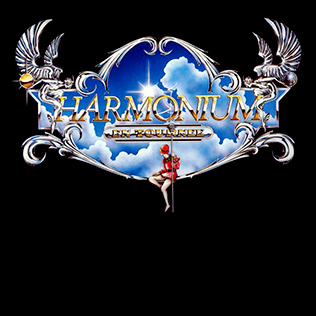
Harmonium en tournée is a live double album by Quebecer progressive rock band Harmonium, consisting of a full performance of its third studio album, L'heptade. The concert was recorded on June 20, 1977, at a sold-out event at the Malkin Bowl in Vancouver, British Columbia, during the band's lengthy L'heptade sur scène tour in promotion of the album. The content offered on the double discs was highly edited from the full, two-hour concert, truncating more than thirty minutes of material by removing much of the between-song French and English banter and explanations from Fiori. It also omits five songs from the show: the song "C'est dans le noir", which was performed as the opener on this tour, as well as performances of "Un musicien parmi tant d'autres" from the band's debut eponymous album, Harmonium, and three from its second release, Les cinq saisons, which were played as encores.
Neil Chotem was a Canadian composer, arranger, conductor, pianist, and music educator.

Love to the World is the third studio album by Los Angeles, California -based band, L.T.D., released in 1976 on the A&M label.

Alone Aboard the Ark is the third studio album by English indie band The Leisure Society, released in April 2013 by record label Full Time Hobby. The album was recorded at The Kinks frontman, Ray Davies, studio Konk.

Deux cents nuits à l'heure is a one-off collaborative album by Québec singer-songwriters Serge Fiori and Richard Séguin, released in 1978. Fiori had taken a break from his progressive rock band, Harmonium, while Séguin's folk group, Les Séguins, had recently folded, leaving the two artists free to collaborate on this new project. When the project was first announced in early 1977, it was to be a trio including Michel Rivard of Beau Dommage, then was expanded to a quartet with the addition of Pierre Bertrand. When Rivard and Bertrand proved unavailable, Fiori and Séguin set out to do the album on their own.

Back Pages is the 17th studio album by America, released on July 26, 2011 by eOne. The album is the band's first studio album of cover versions of songs by some of their favorite songwriters. The album features guest appearances by Mark Knopfler and Van Dyke Parks.

